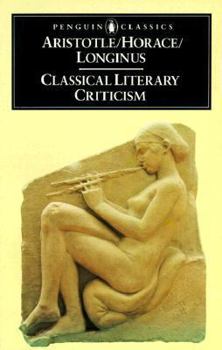Classical Literary Criticism: Poetics; Ars Poetica; On the Sublime
Select Format
Select Condition 
Book Overview
This anthology brings together core classical texts for understanding literature. The selections from Plato illustrate the poetic philosopher's surprising exclusion of poets from his ideal republic.... This description may be from another edition of this product.
Format:Mass Market Paperback
Language:English
ISBN:0140441557
ISBN13:9780140441550
Release Date:January 1965
Publisher:Penguin Group
Length:150 Pages
Weight:0.25 lbs.
Dimensions:0.4" x 5.0" x 7.8"
Customer Reviews
1 rating
Let us sing...and praise...and rhapsodize...
Published by Thriftbooks.com User , 21 years ago
To the Ancients (mostly Greeks and Romans), the mainliterature to be talked of was Poetry, but Poetry wasnot merely what we tend to think of it as being. Forthe Ancients, Poetry was primarily Drama (both Tragedyand Comedy), because their dramas were written inpoetry, Epic poetry, Lyric poetry (shorter song poems),Love Poetry, Choral songs, and Sacred Poetry(Odes and Hymns). The sources of inspiration for all of this creativity,in their belief, was the god Apollo (Master of the Lyre,a type of arm-balanced harp to be plucked with thefingers of the non-holding hand)and the 9 femaledivinities who served under his tutelage and protection,the Muses. Most of the Muses came to be the specificinspirers of some specific type of poetry: Euterpe(Lyric poetry); Thalia (Comic drama poetry and idyllpoetry about shepherds and flocks and countryfiedlovers); Melpomene (Tragic poetry); Terpsichore (Choral song and dance); Erato (Love poetry);Polyhymnia (Sacred Poetry); and Calliope (Epic poetry).The major home where the Muses were believed to residewas Mt. Helicon in Greece, but occasionally they werealso thought to live on Mt. Parnassos (also in ancientGreece). The Romans especially liked to think of theMuses as residing on Mt. Parnassos. This volume is a collection of what is considered tobe the best writing about "literary criticism" -- orrather, poetic criticism from the ancient Greek andRoman world. The pieces by these ancient authorsare presented in the chronological order of when theauthor lived and wrote -- thus, the line of orderfor the pieces is Plato (with the dialogue *Ion*,and sections from the work *Republic* which dealwith poetry and poets, what part the arts shouldplay in the education of the citizen of the republic,and the possible effects of poetry on the ethics,morality, and lifestyles of the citizens of the republic);Aristotle (with his work, *Poetics*, mostly dealingwith tragic-drama poetry, its purpose, its effects--and epic poetry, and a comparison of tragedy andepic); the Roman poet Horace (his verse[!!!] epistlediscussing poetry-*On Poetry*), and Longinus with histreatise *On the Sublime*, which discusses works both inpoetry and prose --and style: the manner in whichthe work is presented, its choice of poetic or prosetype, its use of language, its use of artistic effects[and affects]--Longinus gives us the beginning ofreal, total literary criticism of a work, analyzingnot only the "parts", but the effect of the wholeas a work of art. This is certainly going much farther and deeperthan merely today's "instant" criticism of twothumbs up or two thumbs down...or do I like it, ordon't I like it. This is bringing to bear intelligent,insightful, self-examining criteria as well as turningthe critical examination upon the art work as well.Its is a combination of philosophical examination ofaesthetics (what is beautiful? why is it beautiful?what does it have or do that makes it beautiful? howdoes it produce its effect of beauty upon the behol




